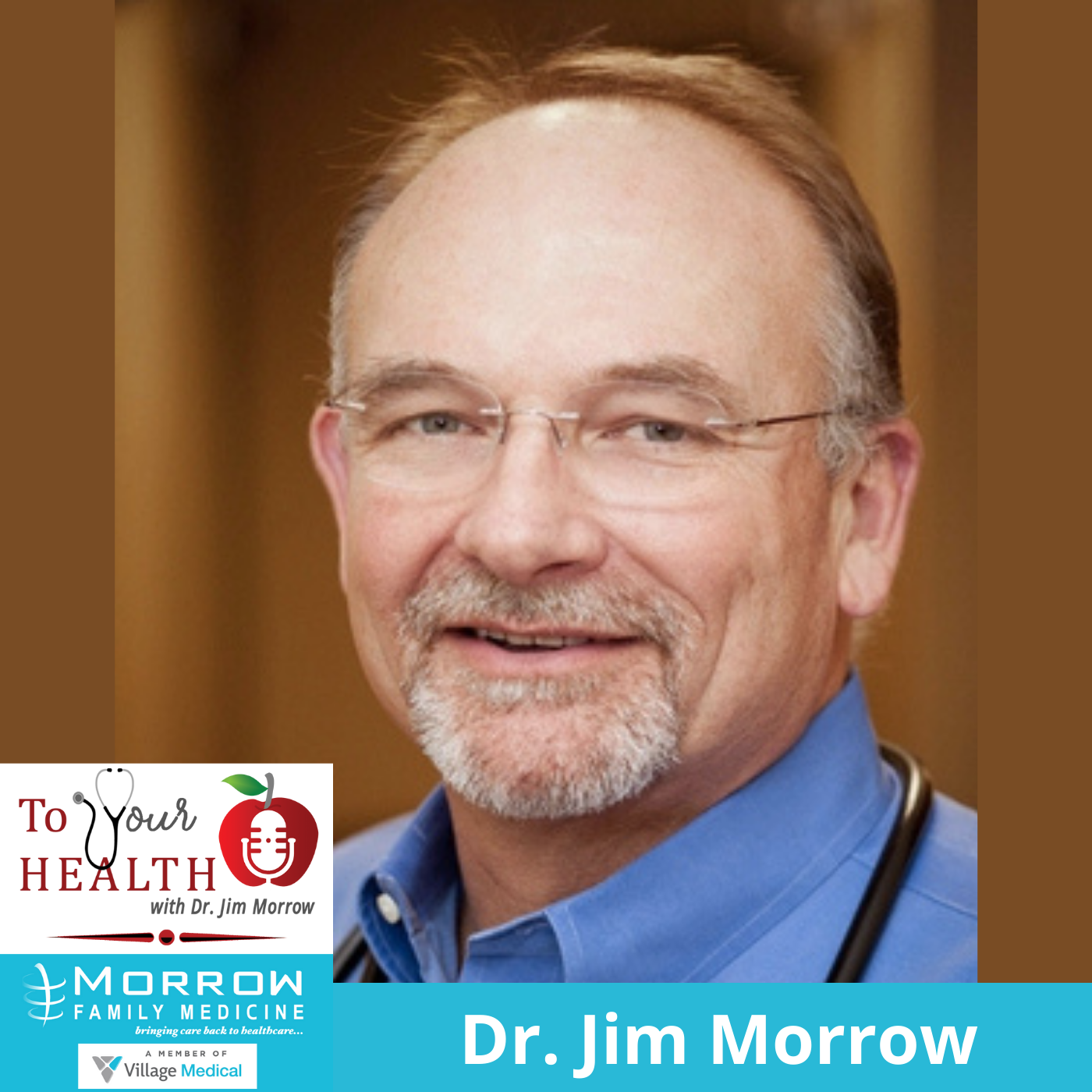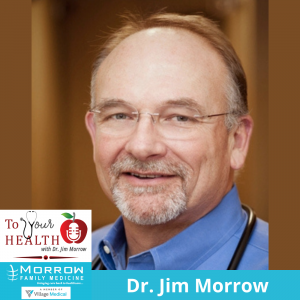
 Marijuana and delta-8 THC (Episode 65, To Your Health with Dr. Jim Morrow)
Marijuana and delta-8 THC (Episode 65, To Your Health with Dr. Jim Morrow)
On this episode of To Your Health, Dr. Morrow discusses delta-8 THC, one of the cannabinoids from the hemp plant. It is not FDA evaluated or approved, and Dr. Morrow covers its risks and adverse effects. To Your Health is brought to you by Morrow Family Medicine, a Member of Village Medical, which brings the care back to healthcare.
About Morrow Family Medicine, A Member of Village Medical
Morrow Family Medicine, a Member of Village Medical, is an award-winning, state-of-the-art family practice with offices in Cumming and Milton, Georgia. The practice combines healthcare information technology with old-fashioned care to provide the type of care that many are in search of today. Two physicians, three physician assistants and two nurse practitioners are supported by a knowledgeable and friendly staff to make your visit to Morrow Family Medicine, A Member of Village Medical one that will remind you of the way healthcare should be. At Morrow Family Medicine, a Member of Village Medical, we like to say we are “bringing the care back to healthcare!” The practice has been named the “Best of Forsyth” in Family Medicine in all five years of the award, is a three-time consecutive winner of the “Best of North Atlanta” by readers of Appen Media, and the 2019 winner of “Best of Life” in North Fulton County.
Village Medical offers a comprehensive suite of primary care services including preventative care, treatment for illness and injury, and management of chronic conditions such as diabetes, congestive heart failure, chronic obstructive pulmonary disease (COPD) and kidney disease. Atlanta-area patients can learn more about the practice here.
Dr. Jim Morrow, Morrow Family Medicine, and Host of To Your Health with Dr. Jim Morrow
 Dr. Jim Morrow is the founder and CEO of Morrow Family Medicine. He has been a trailblazer and evangelist in healthcare information technology, was named Physician IT Leader of the Year by HIMSS, a HIMSS Davies Award Winner, the Cumming-Forsyth Chamber of Commerce Steve Bloom Award Winner as Entrepreneur of the Year and he received a Phoenix Award as Community Leader of the Year from the Metro Atlanta Chamber of Commerce. He is married to Peggie Morrow and together they founded the Forsyth BYOT Benefit, a charity in Forsyth County to support students in need of technology and devices. They have two Goldendoodles, a gaggle of grandchildren and enjoy life on and around Lake Lanier.
Dr. Jim Morrow is the founder and CEO of Morrow Family Medicine. He has been a trailblazer and evangelist in healthcare information technology, was named Physician IT Leader of the Year by HIMSS, a HIMSS Davies Award Winner, the Cumming-Forsyth Chamber of Commerce Steve Bloom Award Winner as Entrepreneur of the Year and he received a Phoenix Award as Community Leader of the Year from the Metro Atlanta Chamber of Commerce. He is married to Peggie Morrow and together they founded the Forsyth BYOT Benefit, a charity in Forsyth County to support students in need of technology and devices. They have two Goldendoodles, a gaggle of grandchildren and enjoy life on and around Lake Lanier.
Facebook: https://www.facebook.com/MorrowFamMed/
LinkedIn: https://www.linkedin.com/company/7788088/admin/
Twitter: https://twitter.com/toyourhealthMD
The complete show archive of To Your Health with Dr. Jim Morrow addresses a wide range of health and wellness topics and can be found at www.toyourhealthradio.com.
Dr. Morrow’s Show Notes
Covid-19 Vaccine Booster Update
Get a darn booster.
If you wanted to be immune badly enough to get the vaccine, you clearly need a booster to stay as immune as possible.
What is this “Delta-8” that everyone is talking about?!?
- Delta-8 tetrahydrocannabinol,
- also known as delta-8 THC,
- is a psychoactive substance found in the Cannabis sativa plant,
- of which marijuana and hemp are two varieties.
- Delta-8 THC is one of over 100 cannabinoids produced naturally by the cannabis plant
- but is not found in significant amounts in the cannabis plant.
- As a result, concentrated amounts of delta-8 THC are typically manufactured from hemp-derived cannabidiol (CBD).
- Delta-8 THC is one of over 100 cannabinoids produced naturally by the cannabis plant
- It is important for consumers to be aware that delta-8 THC products
- have not been evaluated or approved by the FDA for safe use in any context.
- They may be marketed in ways that put public health at risk and should especially be kept out of reach of children and pets.
Here are 5 things you should know about delta-8 THC
- Delta-8 THC products have not been evaluated or approved by the FDA for safe use and may be marketed in ways that put the public health at risk.
- The FDA is aware of the growing concerns surrounding delta-8 THC products currently being sold online and in stores.
- These products have not been evaluated or approved by the FDA for safe use in any context.
- Some concerns include variability in product formulations and product labeling,
- other cannabinoid and terpene content,
- and variable delta-8 THC concentrations.
- Additionally, some of these products may be labeled simply as “hemp products,”
- which may mislead consumers who associate “hemp” with “non-psychoactive.”
- Furthermore, the FDA is concerned by the proliferation of products that contain delta-8 THC and are marketed for therapeutic or medical uses,
- although they have not been approved by the FDA.
- Selling unapproved products with unsubstantiated therapeutic claims is not only a violation of federal law,
- but also can put consumers at risk, as these products have not been proven to be safe or effective.
- This deceptive marketing of unproven treatments raises significant public health concerns because patients and other consumers may use them instead of approved therapies to treat serious and even fatal diseases.
- The FDA has received adverse event reports involving delta-8 THC-containing products.
- From December 2020 through July 2021,
- the FDA received adverse event reports from both consumers and law enforcement
- describing 22 patients who consumed delta-8 THC products;
- of these, 14 presented to a hospital or emergency room for treatment following the ingestion.
- Of the 22 patients, 19 experienced adverse events after ingesting delta-8 THC-containing food products (e.g., brownies, gummies).
- Adverse events included vomiting, hallucinations, trouble standing, and loss of consciousness.
- National poison control centers received 661 exposure cases of delta-8 THC products between January 2018 and July 31, 2021,
- 660 of which occurred between January 1, 2021, and July 31, 2021.
- Of the 661 exposure cases:
- 41% involved unintentional exposure to delta-8 THC and 77% of these unintentional exposures affected pediatric patients less than 18 years of age.
- 39% involved pediatric patients less than 18 years of age
- 18% required hospitalizations, including children who required intensive care unit (ICU) admission following exposure to these products.
- Delta-8 THC has psychoactive and intoxicating effects.
- Delta-8 THC has psychoactive and intoxicating effects,
- similar to delta-9 THC (i.e., the component responsible for the “high” people may experience from using cannabis).
- The FDA is aware of media reports of delta-8 THC products getting consumers “high.”
- The FDA is also concerned that delta-8 THC products likely expose consumers to much higher levels of the substance than are naturally occurring in hemp cannabis raw extracts.
- So, historical use of cannabis cannot be relied upon in establishing a level of safety for these products in humans.
- Delta-8 THC products often involve the use of potentially harmful chemicals to create the concentrations of delta-8 THC claimed in the marketplace.
- The natural amount of delta-8 THC in hemp is very low,
- and additional chemicals are needed to convert other cannabinoids in hemp, like CBD, into delta-8 THC (i.e., synthetic conversion).
- Concerns with this process include:
- Some manufacturers may use potentially unsafe household chemicals to make delta-8 THC through this chemical synthesis process.
- Additional chemicals may be used to change the color of the final product.
- The final delta-8 THC product may have potentially harmful by-products (contaminants)
- due to the chemicals used in the process,
- and there is uncertainty with respect to other potential contaminants that may be present or produced depending on the composition of the starting raw material.
- If consumed or inhaled, these chemicals, including some used to synthesize delta-8 THC and the by-products created during synthesis, can be harmful.
- Manufacturing of delta-8 THC products may occur in uncontrolled or unsanitary settings, which may lead to the presence of unsafe contaminants or other potentially harmful substances.
- Delta-8 THC products should be kept out of the reach of children and pets.
- Manufacturers are packaging and labeling these products in ways that may appeal to children
- (gummies, chocolates, cookies, candies, etc.).
- These products may be purchased online, as well as at a variety of retailers,
- including convenience stores and gas stations, where there may not be age limits on who can purchase these products.
- As I said, there have been numerous poison control center alerts involving pediatric patients who were exposed to delta-8 THC-containing products.
- Also, animal poison control centers have indicated a sharp overall increase in accidental exposure of pets to these products.
- Keep these products out of reach of children and pets.
Why is the FDA notifying the public
about delta-8 THC?
- A combination of factors has led the FDA to provide consumers with this information. These factors include:
- An uptick in adverse event reports to the FDA and the nation’s poison control centers.
- Marketing, including online marketing of products, that is appealing to children.
- Concerns regarding contamination due to methods of manufacturing that may in some cases be used to produce marketed delta-8 THC products.
- The FDA is actively working with federal and state partners to further address the concerns related to these products and monitoring the market for
- product complaints,
- adverse events,
- and other emerging cannabis-derived products of potential concern.
- The FDA will warn consumers about public health and safety issues and take action when necessary when FDA-regulated products violate the law.
How to report complaints and cases of accidental exposure or adverse events:
- If you think you are having a serious side effect that is an immediate danger to your health, call 9-1-1 or go to your local emergency room.
- Health care professionals and patients are encouraged to report complaints and cases of accidental exposure and adverse events to the FDA’s MedWatch Safety Information and Adverse Event Reporting Program:
- Call 800-332-1088 to report a problem.
Credit: http://www.fda.gov/
 Marijuana and delta-8 THC (Episode 65, To Your Health with Dr. Jim Morrow)
Marijuana and delta-8 THC (Episode 65, To Your Health with Dr. Jim Morrow)













